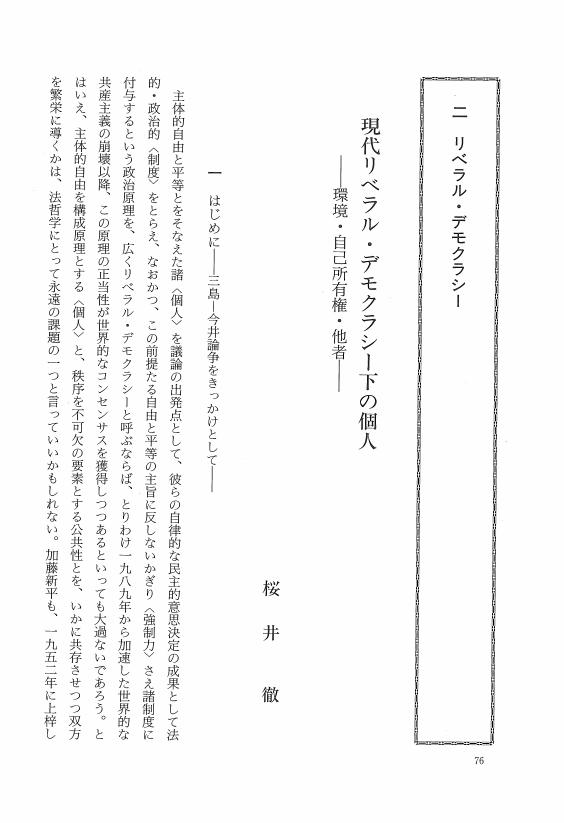8 0 0 0 OA 路面電車の速度向上策の検討(そのII)-運賃収受方法の改善に関する一考察
5 0 0 0 OA 路面電車の速度向上策の検討-停車時間の実態と課題
3 0 0 0 IR グローバル・ジャスティスに直面するリベラル優生主義
- 著者
- 桜井 徹
- 出版者
- 神戸大学
- 雑誌
- 国際文化学研究 : 神戸大学国際文化学部紀要 (ISSN:13405217)
- 巻号頁・発行日
- vol.35, pp.41*-72*, 2010-12
3 0 0 0 鼻腔内逆生歯の 1 例
- 著者
- 桜井 徹 楊 栄展 田中 豊秋 中山 祥和 吉原 純也 今泉 哲
- 出版者
- 九州歯科学会
- 雑誌
- 九州齒科學會雜誌 : Kyushu-Shika-Gakkai-zasshi (ISSN:03686833)
- 巻号頁・発行日
- vol.40, no.2, pp.496-499, 1986-04-25
- 被引用文献数
- 5
A case of inverted tooth eruption in the nasal cavity is reported. A 59-year-old female was referred to the Kyushu Dental College Hospital for evaluation of a fistula in the palate by her dentist. The patient complained of nasal discharge and discomfort in the left nasal cavity. Radiographic examination revealed an inverted tooth in the left nasal cavity. Literature on the inverted tooth was surveyed for the past ten-year, and age, sex, tooth forms, symptoms, and etiology of the inverted tooth were also discussed.
2 0 0 0 OA 書評
1 0 0 0 OA シンポジウムの概要
- 著者
- 桜井 徹
- 出版者
- 日本法哲学会
- 雑誌
- 法哲学年報 (ISSN:03872890)
- 巻号頁・発行日
- vol.2007, pp.136-146, 2008 (Released:2021-03-31)
1 0 0 0 OA 統一テーマ「法思想史学にとって近代とは何か」について
- 著者
- 桜井 徹
- 出版者
- 日本法哲学会
- 雑誌
- 法哲学年報 (ISSN:03872890)
- 巻号頁・発行日
- vol.2007, pp.1-13, 2008 (Released:2021-03-31)
The Annual Meeting of Legal Philosophy 2007 was held at Doshisha University on November 10-11 2007. Its main theme was “What is Modernity for the History of Legal Ideas?”, and nine speakers and one commentator were invited to discuss the meaning and importance of modernity for contemporary legal philosophers. The keynote speech points out that such distinguished thinkers as Hannah Arendt and Charles Taylor use the concept of “alienation” to characterize the intellectual and material movement of modernity. Taylor describes a significant feature of the modern self as “disengaged” not only from the outer world but also from its own body, abilities, inclinations and experiences; it can now work on and discipline these properties until they meet the desired specification. According to Taylor, the modern self that can thus remake Itself is a “punctual” self. Punctual self is a necessary condition not only of what C. B. Macpherson calls “possessive individualism”, but also of social contract theory, since only individuals capable of absolute self-ownership can commit themselves to greater political society and its rulers. The speech also points out that David Hume dramatically reduces Lockean punctual self to “a kind of theatre, where several perceptions successively make their appearances”, and thereby anticipates the subsequent disintegrative process of modern disengaged self. Moreover, Hume asserts that we must first enter a sort of “convention”, that is, “a general sense of common interest; ...which induces them [all the member of the society] to regulate their conduct by certain rules”, in order to establish the rules of private property and of promise. The author claims that Hume’s ideas of the personal identity and the basic rules of conduct suggest a sort of “post modern” insights into the fundamental structure of modern society.
1 0 0 0 OA 書評
1 0 0 0 OA 書評
1 0 0 0 OA 書評
1 0 0 0 OA 現代リベラル・デモクラシー下の個人 環境・自己所有権・他者
- 著者
- 桜井 徹
- 出版者
- 日本法哲学会
- 雑誌
- 法哲学年報 (ISSN:03872890)
- 巻号頁・発行日
- vol.1998, pp.76-94, 1999-10-30 (Released:2008-11-17)
- 参考文献数
- 28
1 0 0 0 OA プーフェンドルフのエンティア・モーラーリア理論
- 著者
- 桜井 徹
- 出版者
- 日本法哲学会
- 雑誌
- 法哲学年報 (ISSN:03872890)
- 巻号頁・発行日
- vol.1991, pp.170-178, 1992-10-30 (Released:2008-11-17)
- 参考文献数
- 12
1 0 0 0 OA 桂木隆夫著『自由と懐疑』 ヒューム法哲学の構造とその生成
- 著者
- 桜井 徹
- 出版者
- 日本法哲学会
- 雑誌
- 法哲学年報 (ISSN:03872890)
- 巻号頁・発行日
- vol.1988, pp.168-174, 1989-10-30 (Released:2008-11-17)
1 0 0 0 OA 経験主義的知識論と社会哲学との相関性 ―モンテーニュとヒュームを手がかりに―
- 著者
- 桜井 徹
- 出版者
- 日本イギリス哲学会
- 雑誌
- イギリス哲学研究 (ISSN:03877450)
- 巻号頁・発行日
- vol.22, pp.37-51, 1999-03-27 (Released:2018-04-25)
Is it possible to regard epistemology as a discipline which is quite independent of social philosophy? This paper focuses on Hume and his precursors, and endeavours to show whether there is any correlation between their empirical theory of knowledge and their social philosophy. Regarding the theorists dealt with in this paper, I would like to submit that the empirical method which may lead to total scepticism about objective knowledge and morality has at least some psychological connection with the idea of the acceptance of existing social institutions.









